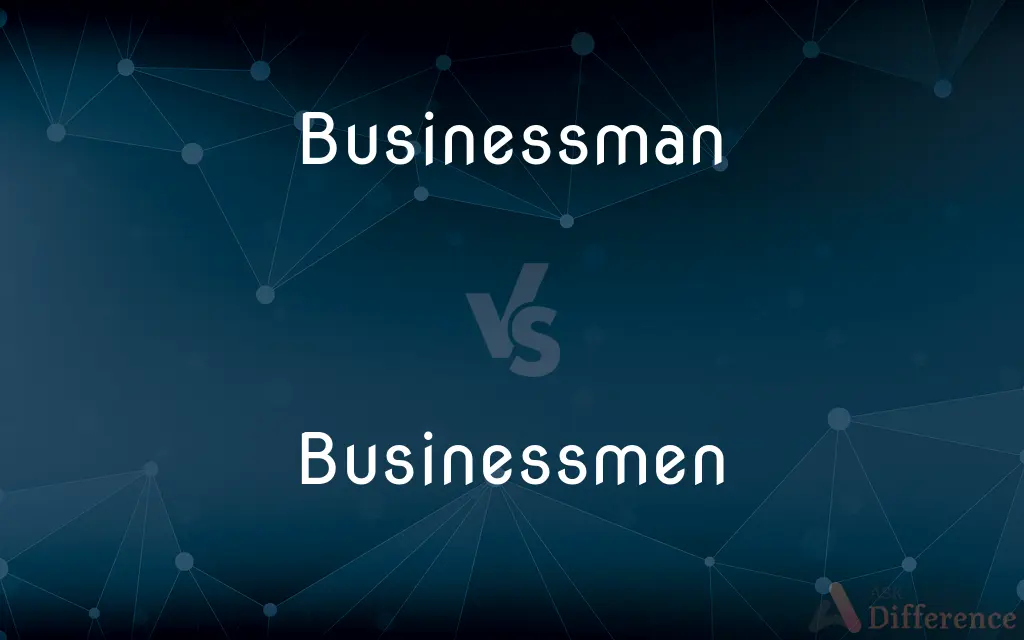Businessman vs. Businessmen — What's the Difference?
Edited by Tayyaba Rehman — By Urooj Arif — Updated on March 26, 2024
"Businessman" refers to a singular male engaged in business activities, while "businessmen" is the plural form, indicating multiple individuals.

Difference Between Businessman and Businessmen
Table of Contents
ADVERTISEMENT
Key Differences
A businessman is an individual male who participates in activities related to commerce or the management of a business. This term emphasizes the singular nature of the person involved in these operations, focusing on his role within the business world, whether as an entrepreneur, executive, or manager. In contrast, businessmen refers to a group of male individuals engaged in similar commercial or business activities. The shift from singular to plural form expands the scope from an individual's actions and decisions to the collective efforts and achievements of a group working within the business sector.
While the term "businessman" highlights the actions, decisions, and responsibilities of one person, "businessmen" encompasses the collective actions and contributions of multiple individuals. This distinction is crucial when discussing business operations, strategies, or impacts, as it shifts the focus from individual to collective achievements and challenges within the business world. On the other hand, "businessmen" can refer to a network or community of male business professionals, emphasizing the importance of collaboration, networking, and shared goals within the industry.
In the context of discussions, articles, or reports, using "businessman" or "businessmen" correctly can significantly affect the clarity and accuracy of the information presented. For example, when referring to a specific male individual's achievements or challenges in business, "businessman" is appropriate. Conversely, when discussing trends, patterns, or issues affecting a broader group of male business professionals, "businessmen" is the correct term.
The evolution of language and the increasing focus on gender inclusivity in the business world have led to discussions about the use of gender-neutral terms like "businessperson" or "businesspeople." These terms serve to include all genders in the conversation about business, reflecting the diverse nature of modern workplaces. However, when specifically referring to male individuals or groups in a business context, "businessman" and "businessmen" remain commonly used.
Despite these nuances, the core distinction between "businessman" and "businessmen" lies in the number of individuals involved. This fundamental difference is crucial for ensuring accurate and effective communication, especially in professional and academic contexts where specificity and clarity are paramount.
ADVERTISEMENT
Comparison Chart
Definition
A singular male engaged in business activities.
Plural form, referring to multiple male individuals in business.
Focus
Individual actions and responsibilities in business.
Collective efforts and achievements in the business sector.
Context Usage
Used when referring to one male business professional.
Used when discussing a group of male business professionals.
Implication
Highlights the role and impact of an individual.
Emphasizes teamwork, networking, and collective impact.
Gender Inclusivity
Specific to male individuals.
Also specific to male, but reflects a group dynamic.
Compare with Definitions
Businessman
A man who works in business or commerce, especially at an executive level.
As a seasoned businessman, he understands the market well.
Businessmen
A network of male entrepreneurs sharing insights and resources.
The forum provides a platform for businessmen to exchange ideas.
Businessman
A male individual who is involved in commercial, industrial, or professional activities.
The businessman invested in several startups this year.
Businessmen
Men who operate or own businesses collectively.
Local businessmen are collaborating on a community project.
Businessman
Someone who engages in the activities of buying and selling goods and services.
The local businessman opened a new store downtown.
Businessmen
A group of male individuals engaged in business activities.
The conference attracted businessmen from various sectors.
Businessman
A male entrepreneur or owner of a business.
The businessman is known for his innovative approach to technology.
Businessmen
Male executives or professionals in the business world.
Businessmen in the finance sector are facing unprecedented challenges this year.
Businessman
A man who makes decisions and engages in activities to promote economic growth.
The successful businessman was featured in a leading business magazine.
Businessmen
A collective of men involved in commercial and economic activities.
Businessmen in the region are optimistic about the economic recovery.
Businessman
A man who works in commerce, especially at executive level.
Businessmen
A man engaged in business. See Usage Note at chairman.
Businessman
A man engaged in business. See Usage Note at chairman.
Businessmen
Plural of businessman
Businessman
A man in business, one who works at a commercial institution.
Businessmen
The body of individuals who manage businesses
Businessman
A person employed in a business at a managerial level, especially an executive or proprietor.
Businessman
A person engaged in commercial or industrial business (especially an owner or executive)
Common Curiosities
How does the term "businessmen" differ from "businessman"?
"Businessmen" is the plural of "businessman," referring to multiple male individuals in the business world.
Can "businessman" refer to anyone in business, regardless of their role?
Yes, "businessman" can refer to any male individual in business, from entrepreneurs to executives.
Why is it important to distinguish between "businessman" and "businessmen"?
The distinction clarifies whether the discussion is about an individual or a group, affecting the context and understanding of statements.
How has the usage of "businessman" evolved over time?
The usage of "businessman" has broadened to encompass various roles within business, and there's an increasing preference for gender-neutral terms.
Can "businessmen" be used to refer to a mixed-gender group?
Technically, "businessmen" refers to male individuals; "businesspeople" is more inclusive for mixed-gender groups.
Is "businessman" considered formal or informal language?
"Businessman" is formal language, appropriate in business and professional contexts.
What defines a businessman?
A businessman is a male individual actively involved in commercial, professional, or industrial activities.
Are there gender-neutral alternatives to "businessman" and "businessmen"?
Yes, terms like "businessperson" and "businesspeople" are gender-neutral alternatives.
Do "businessman" and "businessmen" have different connotations?
While the core difference is in number, "businessmen" might imply a network or collective action, unlike the individual focus of "businessman."
How important is context when using "businessman" vs. "businessmen"?
Context is crucial; it determines whether the focus is on an individual's role or on collective business efforts.
How can one choose between "businessman" and "businessmen" in writing?
Choose based on the number of individuals you're referring to and the context of your discussion or writing.
Does the distinction between these terms affect business communication?
Yes, accurate use of these terms ensures clarity and professionalism in business communication.
Are there any cultural differences in the use of "businessman" and "businessmen"?
Usage can vary by culture, especially with the global shift towards more inclusive business language.
Is there a trend towards using more inclusive language in business contexts?
Yes, there's a growing trend towards using gender-neutral language in business to include all genders equally.
What impact does using the correct term have on professional image?
Using the correct term enhances professionalism and clarity in communication.
Share Your Discovery

Previous Comparison
Rock vs. Blues
Next Comparison
Chiropractor vs. OsteopathAuthor Spotlight
Written by
Urooj ArifUrooj is a skilled content writer at Ask Difference, known for her exceptional ability to simplify complex topics into engaging and informative content. With a passion for research and a flair for clear, concise writing, she consistently delivers articles that resonate with our diverse audience.
Edited by
Tayyaba RehmanTayyaba Rehman is a distinguished writer, currently serving as a primary contributor to askdifference.com. As a researcher in semantics and etymology, Tayyaba's passion for the complexity of languages and their distinctions has found a perfect home on the platform. Tayyaba delves into the intricacies of language, distinguishing between commonly confused words and phrases, thereby providing clarity for readers worldwide.















































